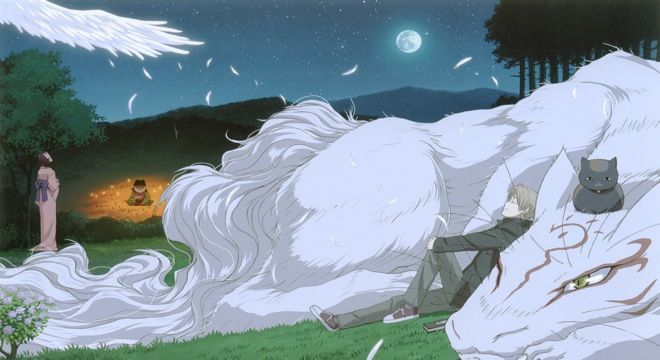This article was written by LoneWolf and edited by matangi and 16and of the MAL Articles Club.
Interested in writing or editing for us? Click here!

Natsume Yujinchou Season 5 was produced by studio Shuka after 4 seasons of being produced under studio Brain's Base
The topic of anime studios is one that is discussed often within the anime community. A few years ago, most anime watchers weren't even aware of the studios producing the media they consume, especially when it came to older anime that were popular in the west like Dragon Ball Z and Sailor Moon (both of which were produced by Toei Animation). The studio has become an important point of discussion for anime viewers in recent years and one of the main factors to consider in the production of an anime. This is not the case for western entertainment, where the director and actors are given more importance. A comparable aspect of western cartoons is the channel or network -- for example Cartoon Network, Nickelodeon, and the Disney Channel. While these networks do hold some measure of importance, it's nowhere near the level of importance that's given to studios producing anime. This is due to anime mostly being viewed online through streaming services instead of on TV. Due to these differences, anime are more often associated with the production studio instead of the TV network. This also leads to production studios more likely to be seen as creative entities with their own unique vision.
The main reason why studios have become such an important part of anime culture, and such a heavily discussed talking point, is that many studios throughout the years have created a distinct and unique identity for themselves. This is something that sets a studio apart from other studios, whether that be a unique visual identity or certain tropes associated with anime from that specific studio.
Studio SHAFT, for example, has their highly saturated colors, stylized backgrounds, and signature head tilts. There are studios which thrive off a very strong reputation such as Studio Madhouse, which is renowned for its many high quality adaptations of manga and the variety of shows they've produced. Studios like Pierrot and Toei are known for their commitment to one demographic; in their case producing long-running shounen series such as One Piece, Naruto, and Bleach. There are studios known for producing anime of a certain genre — for example, Sunrise producing mecha anime or Kyoto Animation producing slice of life anime. Studios like Studio 4°C are known for simply being incredibly experimental.

From left to right: logos for Studio 4°C, Sunrise Studios, Toei Animation and Studio SHAFT
What is Studio Migration?

From left to right: logos for studio Madhouse, Gainax, Brain's Base and Production IG.
What exactly is "studio migration", and what does it have to do with studios not making the same kind of anime anymore? The main idea is very simple: the studio can't churn out anime after anime by itself, but rather it's the individuals behind the studio that are responsible for the creation of the anime. When some of these people decide to leave the studio, obviously the studio will not be the same anymore. There have been many cases of this occurring within the last few years, such as Madhouse co-founder Masao Maruyama leaving Madhouse and directors Hideaki Anno and Hiroyuki Imaishi leaving Gainax.
What happens when these individuals leave? Usually they leave to create their own studios. In the case of Imaishi, he teamed up with some other former Gainax staff to create Studio Trigger, while Anno left to create Studio Khara, and with Maruyama leaving Madhouse to create Studio MAPPA. Some other cases of this occurring include former Brain's Base staff leaving to create studio Shuka, former Production I.G staff leaving to create Wit Studio and former Sunrise staff leaving to create Studio Bones. Below is a video detailing how Madhouse has silently fallen due to various members of the studio leaving, and how they are slowly rebuilding themselves through their new staff.
https://www.youtube.com/watch?v=c6Txhokrw48
So with all of these creators leaving their respective studios, one must wonder "why"? Why would you abandon the brand recognition and resources that a large and reputable studio must provide? It's most often due to creative differences and freedoms. Needless to say, when you create your own studio, you have much more freedom over what type of anime you can create and fewer hoops to jump through to get it made. It must be incredibly frustrating as a creator to not be able to work on the type of anime that you want to or to not have as much creative control as you want. Considering these difficulties, you can't really blame individuals for leaving to create their own studios.
Many anime feature film directors are known for having their own studios in order to have the most creative control over their work. Some examples include Hayao Miyazaki and Isao Takahata creating Studio Ghibli and Mamoru Hosoda and his new studio Studio Chizu, which was made to help produce his two latest films. Another reason as to why new studios are formed is to continue a previous franchise. For example, Hideaki Anno continuing Evangelion through Studio Khara, which was originally produced by Gainax, and Studio Shuka concluding the Durarara!! franchise and resuming Natsume Yujinchou, which were originally produced by Brain's Base.
Final Thoughts

From left to right: logos for studio MAPPA, Trigger, Shuka Studio and Wit Studio.
If you have been wondering why your favorite studio isn't making good anime anymore, it's most likely because the people at the studio that were creating the anime you liked have left the studio. My goal with this article is to help anime fans think about production studios differently and to help explain why so many new studios have been appearing lately. The creators at a studio are what make the studio what it is; without those creators, the studio is just a brand. We will definitely see many more studios being created in order to achieve greater creative freedom in the future. What long term-impacts will studio migration have on the industry and will bigger studios fall apart because of this? These questions will only be answered with time, and will vary based on the specific studio, but change is inevitable. There are many factors to consider when talking about anime, and the production studio is undoubtedly one of the most important factors, but next time you think about a production studio remember that there are people behind that studio that make the anime you watch what it is.




